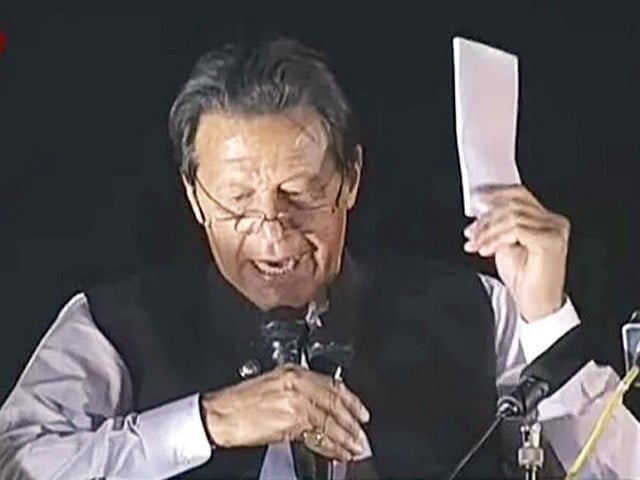
PTI founding chairman Imran Khan’s counsel Barrister Salman Safdar on Wednesday contended before the Islamabad High Court that registering the cipher case only against his client was an ‘act of retaliation’ as others had not returned the copies of the diplomatic cable until it was filed.
A division bench of the IHC, comprising its Chief Justice Aamer Farooq and Justice Miangul Hassan Aurangzeb, heard Imran as well as PTI vice chairman and former foreign minister Shah Mahmood Qureshi’s appeals against their conviction in the case.
During the hearing, Safdar maintained that the requirements of a fair trial under Article 10A had not been fulfilled. The lawyer told the court that the diplomatic cable was not shown to the investigation officer (IO) terming it ‘secret’.
He added that the IO should have approached the magistrate. Safdar continued that the IO had presented the challan without even reading the document. He further noted that the trial court judge had also framed the charges without perusing the diplomatic cable.
The bench observed that the judge could have ordered under the Official Secrets Act that the document should be shown after removing all the people from the courtroom.
Drawing similarities, the lawyer said it just like as if it was a murder case but the body was missing. He told the court that the matter was related to foreign affairs but was ‘hijacked’ by the interior ministry.
“Instead of the Foreign Office, the interior ministry became the complainant,” he added. The lawyer noted that the ministry in its complaint maintained that if the diplomatic cable was not returned, the whole security system would be compromised.
Safdar noted that Imran and Qureshi had been accused of making the text of the cipher public and ‘twisting’ it for their personal gains. However, he expressed his surprise that neither the original document nor the ‘twisted’ one was available. The lawyer wondered how the text of both the documents could be compared when neither was in front of them. He further pointed out that the FIR was registered 17 months after the then premier Imran’s copy was not returned.
Safdar observed that the prosecution claimed that the copies of the diplomatic cable were sent to five people.
However, he noted that the document of one of the prosecution witnesses read that the copies were sent to nine people instead of five.
“This is their cipher security system,” he sarcastically said.
The lawyer said with the exception of the then president Dr Arif Alvi, the copies of the diplomatic cable were not returned by those who had them until the case was registered.
Safdar recalled that a meeting of the National Security Committee (NSC) was held in March 2022 under the chairmanship of the then premier Imran.
He added that the committee had termed the ‘cipher message’ an ‘intolerable’ interference in Pakistan’s internal affairs.
Imran’s counsel reminded the bench that another meeting of the NSC was held 22 days later under the chairmanship of PM Shehbaz Sharif that verified the stance of the previous huddle.
However, he continued that the NSC under PM Shehbaz had refuted the existence of a foreign conspiracy.
Justice Aurangzeb asked the lawyer what he meant by the term conspiracy.
The judge pointed out that the statement released by the NSC after the earlier meeting did not mention any conspiracy.
He inquired if this was the same conspiracy that Imran had spoken about during a public gathering.
Later, the IHC adjourned the hearing of the appeals till Thursday (today).





1731916090-0/sabrina-(3)1731916090-0-165x106.webp)















COMMENTS
Comments are moderated and generally will be posted if they are on-topic and not abusive.
For more information, please see our Comments FAQ